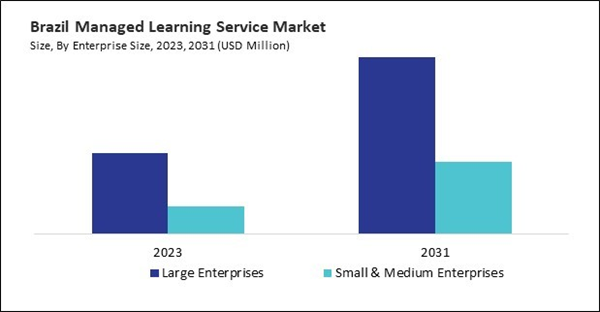The Brazil market dominated the LAMEA Managed Learning Service Market by Country in 2023, and is forecast to continue being a dominant market till 2031; thereby, achieving a market value of $187 million by 2031. The Argentina market is registering a CAGR of 13.2% during (2024 - 2031). Additionally, The UAE market would capture a CAGR of 12% during (2024 - 2031).
MLS solutions are increasingly integrated with talent management systems (TMS), human resource management systems (HRMS), and enterprise resource planning (ERP) platforms. This integration enables seamless data exchange, automates administrative tasks such as learner registration and tracking, and aligns training initiatives with organizational goals and performance metrics. Integrated MLS platforms provide comprehensive insights into workforce capabilities, training effectiveness, and career progression, enabling organizations to make data-driven decisions regarding talent development and succession planning.
Likewise, the managed learning services market is continually evolving, driven by emerging trends reshaping the corporate learning and development landscape. These trends highlight new directions, technological advancements, and strategic shifts that MLS providers and organizations adopt to enhance learning effectiveness, engagement, and efficiency. Hybrid learning models combine traditional face-to-face instruction with online and virtual learning components. This trend has gained momentum with the proliferation of remote work and the need for flexible learning solutions. MLS providers offer blended learning programs integrating virtual classrooms, on-demand e-learning modules, and interactive sessions to cater to diverse learner preferences and maximize learning outcomes.
In addition, the BFSI sector's expansion in Saudi Arabia is generating a growing demand for specific training courses tailored to financial professionals' requirements. Managed learning services providers are developing training modules in Islamic finance principles, banking operations, risk management, financial technology (FinTech), and regulatory compliance to enhance skills and knowledge among industry professionals. According to the government of Saudi Arabia, the Financial Sector Development Program aims to create a thriving financial sector that is a key enabler in achieving Vision 2030 objectives. The banking sector is expected to achieve total banking assets of SAR 4.553 bn in 20230 from SAR 2.631 bn recorded in 2019.
Additionally, the stock market's value as a percentage of GDP will rise from 66.5% in 2019 to 88% in 2030. The Saudi Arabian BFSI sector is embracing digital transformation and adopting FinTech solutions to enhance customer experience, operational efficiency, and financial inclusion. MLS providers collaborate with financial institutions to offer training on digital banking platforms, blockchain technology, AI-driven analytics, and cybersecurity best practices, empowering professionals to leverage these innovations effectively. Hence, the expansion of the BFSI sector and rising investment in the region's healthcare sector are driving the market's growth.
List of Key Companies Profiled
- Schouten & Nelissen B.V.
- Capita Plc (Chartered Institute of Public Finance and Accountancy)
- Learning Tree International, Inc.
- TTEC Holdings, Inc.
- Infopro Learning, Inc.
- Hemsley Fraser Group Ltd. (Demos Group)
- Learning Technologies Group Plc
- Wahoo Learning Limited
- The Training Associates Corporation
Market Report Segmentation
By Enterprise Size- Large Enterprises
- Small & Medium Enterprises
- Instructor-Led Training
- Distance Learning
- Blended Training
- Sourcing External Training
- L&D Administration
- Supplier Management
- Others
- Telecommunications & IT
- Education
- Consumer Goods & Retail
- Healthcare
- Banking, Financial Services, & Insurance (BFSI)
- Others
- Brazil
- Argentina
- UAE
- Saudi Arabia
- South Africa
- Nigeria
- Rest of LAMEA
Table of Contents
Companies Mentioned
- Schouten & Nelissen B.V.
- Capita Plc (Chartered Institute of Public Finance and Accountancy)
- Learning Tree International, Inc.
- TTEC Holdings, Inc.
- Infopro Learning, Inc.
- Hemsley Fraser Group Ltd. (Demos Group)
- Learning Technologies Group Plc
- Wahoo Learning Limited
- The Training Associates Corporation









